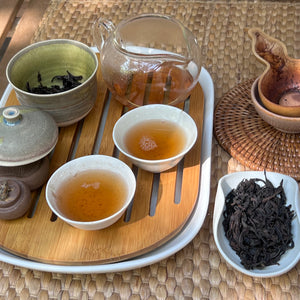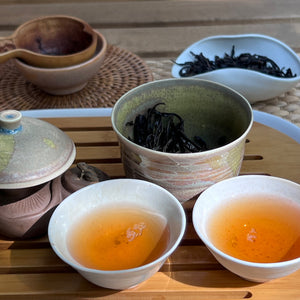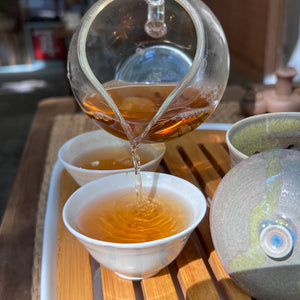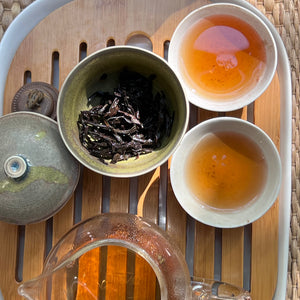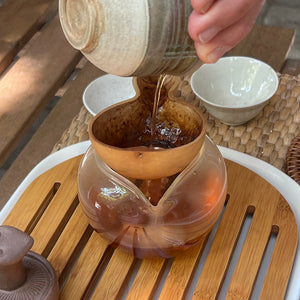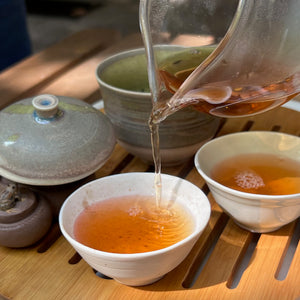
Buttery, softly roasted Wuyi rock oolong with clean minerality and a long-lasting fruity-floral finish.
Detailed description
Qi Dan (奇丹) is a historically prominent cultivar from the Wuyi Mountains. Many producers also make it as a stand-alone batch, because the variety beautifully brings out the classic Wuyi characteristics: tight structure, “rock-minerality” ( yan yun ) and floral-fruity aromatics.
Origin
Geography: Wuyi Mountains (Zhengyan core area), Fujian, China.
Category: oolong (yancha, “rock tea”).
Cultivar: Qi Dan – a variety related to the Da Hong Pao line, also highly regarded in its own right.
Processing
Traditional Wuyi style: medium roasting, in several stages, with longer resting periods. The goal is to clean, creamy texture and balanced aroma without excessive smoky notes.
Flavor profile
The opening is silky and clean, with a buttery-creamy texture; a mineral backbone in the middle and delicate orchid floral notes, red berry/dried fruit nuances on the finish.
Flavor profile – broken down
- Aroma: lightly roasted hazelnuts, cocoa powder, dry wood, orchid.
- Body: medium-full → full, creamy mouthfeel.
- Taste: soft roast, clean minerality, delicate florality (orchid-like), with a red berry finish.
- Decay: long, clear, "rock sound" ( yan yun ).
- Sensory impression: elegant, well-controlled roasted yancha – for everyday and festive tea drinking.
Preparation instructions
Asian (gaiwan/hohin – gongfu)
- Tea/water: 7–8 g/100–120 ml
- Water temperature: 98–100 °C
- Rinse: 1 quick (3–5 sec)
- Soaks (guideline): 1) 8–12 sec → 2) 10–15 sec → 3) 15–20 sec, then increase by 5–10 sec per round. 8–10 pours is realistic.
- Tip: if the pressing/twisting is very tight, let it "warm up" for 1-2 minutes after rinsing.
West
- Tea/water: 3–4 g/250–300 ml
- Water temperature: 95–98 °C
- Soaking: 2:30–3:30 minutes
- Re-soak: 1× 4–5 minutes (the roasting will not “stick” if the water is clean and soft).
Cold brew
- Tea/water: 10 g/1 liter of cold, filtered water
- In the refrigerator: 8–10 hours
- Consumption: strained; best served chilled within 24–48 hours.
Unpacking and storage
25 g / 50 g / 100 g in aroma-sealed sachets. Keep in a cool, dry place, protected from light; reseal carefully after opening.
Who do we recommend it to?
- Those looking for the classic Wuyi line with pure minerality and controlled roasting.
- For Yancha fans who love orchid- like florals and a long finish.
- For "Gongfu" tea drinking and more in-depth, multi-pouring occasions.
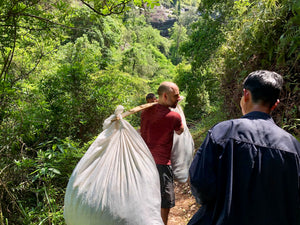
Personal contact
Our teas don't come from wholesale warehouses or unknown sources. We travel to the small producers we source from – whether it's a Japanese family tea garden, a Chinese mountain village or an oolong maker in Taiwan.
Stories
We meet them in person, learn their story, see how they care for their plants, and how they process the fresh leaves.
These experiences are the soul of our teas. This way, not only is the quality guaranteed, but also the fact that behind each cup there is a real person, a real story.
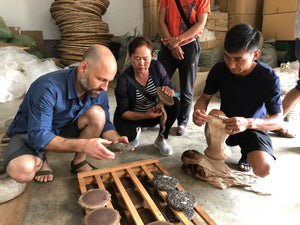
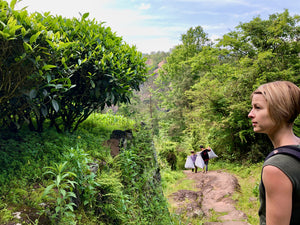
Direct
This direct relationship is valuable to us. Not only because of the excellent tea, but because we believe that trust, respect and personal presence are what make the tea drinking experience truly special.
Teavolution Tea Blog
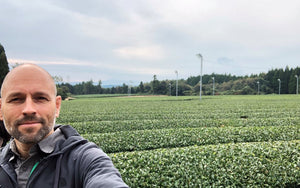
Oct 2, 2025
Sencha tea
Read more

Sep 21, 2025
Matcha hiány Japánban
Read more
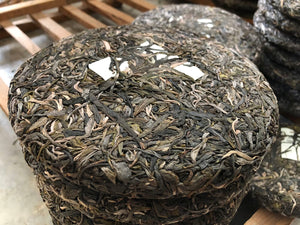
Mar 18, 2025
Puer tea, puerh or pu-erh
Read more
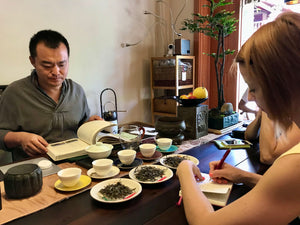
Mar 18, 2025
Types of tea
Read more
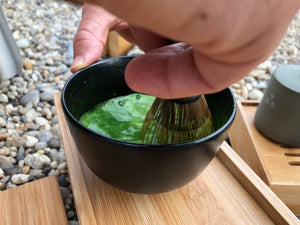
Mar 18, 2025
What is matcha tea?
Read more

Mar 18, 2025
Oolong tea (Wulong tea)
Read more

